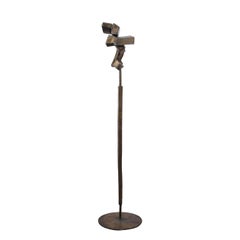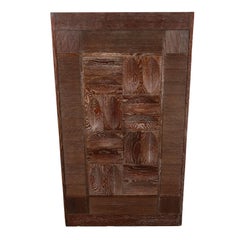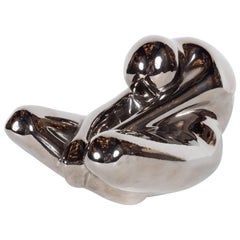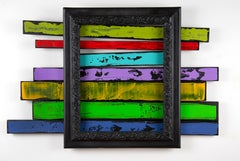High Style Deco Abstract Sculptures
to
1
2
Overall Width
to
Overall Height
to
3
2
1
3
1
1
1
1
1
1
1
3
Untitled
By Tony Rosenthal
Located in New York, NY
This stunning Mid Century Modern welded bronze sculpture was realized by the esteemed 20th Century artist Tony Rosenthal circa 1965. Signed and dated by the artist (and with an inclu...
Category
1960s Abstract Expressionist Abstract Sculptures
Materials
Bronze
$24,975
Untitled
Located in New York, NY
This sophisticated sculpture was realized from lymed French oak circa 1950. The perimeter of the piece consists of a mosaic of rectilinear blocks, while the interior rectangular pane...
Category
1960s Abstract Geometric Abstract Sculptures
Materials
Oak
$3,475
Modernist Ceramic Platinum-Plated Crouching Man Sculpture by Jaru, circa 1970
By Jaru
Located in New York, NY
This Modernist ceramic sculptures depicts an abstracted and cubist human form sitting cross legged with his back bent forward and arms outstretched. The sculpture, realized by Jaru o...
Category
1970s Abstract Expressionist Figurative Sculptures
Materials
Ceramic
Related Items
Front City Mid-20th Century Abstract Gold Patinated Bronze Italian Sculpture
Located in Brescia, IT
This gold color patinated bronze sculpture is made by Lino Tinè a contemporary abstract sculptor that lives and works in Milan, Italy.
The sculpture expresse...
Category
Late 20th Century Abstract Expressionist Abstract Sculptures
Materials
Bronze
$8,306
H 10.63 in W 11.82 in D 6.3 in
"The Bigger Picture", abstract sculpture, found frame, wood, paint, geometry
Located in Toronto, Ontario
"The Bigger Picture" is an abstract artwork by Stan Olthuis composed of acrylic paint on pine wood and reclaimed picture frame. The Bigger Picture measures...
Category
21st Century and Contemporary Abstract Geometric Abstract Sculptures
Materials
Acrylic, Wood, Found Objects
$2,500
H 24 in W 37 in D 2 in
Bintou Italy 1969 Bronze Abstract Sculpture
By Andrea Picini
Located in Brescia, IT
This is an intense bronze abstract sculpture and it was created by the Italian artist Andrea Picini.
The artwork is hand made by the technic of the ...
Category
1960s Abstract Expressionist Abstract Sculptures
Materials
Bronze
Reaching (bronze hand)
Located in Wilton Manors, FL
Reaching, ca. 1980. Cast bronze. Signed in lower region on wrist.
A rare example from the artist's later period influenced by figurative abstraction with expressionist tendencies.
James Edward Lewis (August 4, 1923 – August 9, 1997) was an African-American artist, art collector, professor, and curator in the city of Baltimore. He is best known for his role as the leading force for the creation of the James E. Lewis Museum of Art, an institution of the HBCU Morgan State University. His work as the chairman of the Morgan Art Department from 1950 to 1986 allowed for the museum to amass a large collection of more than 3,000 works, predominantly of African and African diasporan art.[1] In addition, he is also well known for his role as an interdisciplinary artist, primarily focused on sculpture, though also having notable examples of lithography and illustration. His artistic style throughout the years has developed from an earlier focus on African-American history and historical figures, for which he is most notable as an artist, to a more contemporary style of African-inspired abstract expressionism.
Early and personal life
James E. Lewis was born in rural Phenix, Virginia on August 4, 1923 to James T. Lewis and Pearline (Pearlean) Harvey.[5] Lewis' parents were both sharecroppers. Shortly after his birth, his father moved to Baltimore for increased job opportunity; James E. was subsequently raised by his mother until the family was reunited in 1925. They lived for a short time with distant relatives until moving to a four-bedroom house on 1024 North Durham Street in East Baltimore, a predominantly African-American lower-class neighborhood close to Johns Hopkins Hospital. Lewis' primary school, PS 101, was the only public school in East Baltimore that served black children. Lewis grew up in a church-going family, his parents both active members of the Faith Baptist Church, devoting the entirety of their Sundays to church activities. His parents worked a variety of different jobs throughout his youth:[6] his father working as a stevedore for a shipping company, a mechanic, a custodian, a mailroom handler,[6] and an elevator operator.] His mother worked as both a clerk at a drugstore[7] and a laundress for a private family.[4]
Lewis' primary exposure to the arts came from Dr. Leon Winslow, a faculty member at PS 101 who Lewis saw as "providing encouragement and art materials to those who wanted and needed it." In fifth grade, Lewis transferred to PS 102. Here, he was able to receive specialized Art Education in Ms. William's class under the guidance of Winslow. He was considered a standout pupil at PS 102 as a result of his introduction to the connection between the arts and the other studies. His time spent in Ms. Pauline Wharton's class allowed for him to experiment with singing, to which he was considered a talented singer. His involvement in this class challenged his earlier belief that singing was not a masculine artistic pursuit. He was able to study both European classics and negro spirituals, which was one of his earliest introductions to arts specific to American black culture. Under Ms. Wharton's direction, he was also involved in many different musical performances,[6] including some works of the Works Progress Administration's Federal Theatre Project.[8] Lewis attended Paul Laurence Dunbar High School, where his love of the arts was heightened through his industrial art class with Lee Davis...
Category
Mid-20th Century Abstract Expressionist Abstract Sculptures
Materials
Bronze
Vintage Abstract Expressionist Ibram Lassaw Modernist Bronze Sculpture Pendant
By Ibram Lassaw
Located in Surfside, FL
IBRAM LASSAW
(Russian-American, 1913-2003),
Sculptural pendant
Gold plated bronze
Signed verso
Measurements: 2-7/8''h, 2-1/4''w.
Ibram Lassaw was born in Alexandria, Egypt, of Russian Jewish émigré parents. After briefly living in Marseille, France, Naples, Italy Tunis, Malta, and Constantinople, Turkey his family settled in Brooklyn, New York, in 1921.His family settled in Brooklyn, New York. He became a US citizen in 1928. Ibram Lassaw, one of America's first abstract sculptors, was best known for his open-space welded sculptures of bronze, silver, copper and steel. Drawing from Surrealism, Constructivism, and Cubism, Lassaw pioneered an innovative welding technique that allowed him to create dynamic, intricate, and expressive works in three dimensions. As a result, he was a key force in shaping New York School sculpture.He first studied sculpture in 1926 at the Clay Club and later at the Beaux-Arts Institute of Design in New York. He made abstract paintings and drawings influenced by Kandinsky, Sophie Taeuber Arp, and other artists. He also attended the City College of New York. Lassaw’s encounter with avant-garde art in the International Exhibition of Modern Art (1926), organized by the Société Anonyme at the Brooklyn Museum, made a powerful impression on him. In the early 1930s he explored new materials and notions of open-space sculpture. The ideas of László Moholy-Nagy and Buckminster Fuller were important to him, and he knew the work of Julio González, Pablo Picasso, and the Russian Constructivists. After experimenting with plaster, rubber and wire, Lassaw began working with steel, which became a frequent medium for the artist, along with other metals. His work reflects the influence of Surrealist artists such as Alberto Giacometti and Joan Miro as well as American Modernist Alexander Calder.A pioneer of abstract sculpture in the United States, in 1936 Lassaw was a founding member of the organization American Abstract Artists. Between 1933 and 1942 he worked for various federal arts projects: the Public Works of Art Project, Civil Works Authority, and WPA, the Works Progress Administration Federal Art Project. In 1938 he produced his first welded work. He served with the U.S. Army, where he learned direct welding techniques. During the 1940s he experimented with cage constructions and with acrylic plastics, adding color to his sculptures by applying dye directly to their surfaces. In 1949 Lassaw was a founder of the Club, an informal discussion group of avant-garde artists that had developed from gatherings at his studio, on Eighth Street.
During the mid-1930s, Lassaw worked briefly for the Public Works of Art Project cleaning sculptural monuments around New York City. He subsequently joined the WPA as a teacher and sculptor until he was drafted into the army in 1942. Lassaw's contribution to the advancement of sculptural abstraction went beyond mere formal innovation; his promotion of modernist styles during the 1930s did much to insure the growth of abstract art in the United States. He was one of the founding members of the American Abstract Artists group, and served as president of the American Abstract Artists organization from 1946 to 1949. In 1951, Samuel Kootz invited Lassaw to join his gallery in New York. He also had a summer gallery in Provincetown, MA. Lassaw had been summering in Provincetown since 1944, and in 1951 rented an apartment next door to the Kootz Gallery. Among the artists in the Kootz Gallery were Jean Arp, William Baziotes, Georges Braque, Jean Dubuffet, Herbert Ferber, Arshile Gorky, Adolph Gottlieb, David Hare, Hans Hofmann, Fernand Leger, Georges Mathieu, Joan Miró, Robert Motherwell, Pablo Picasso, Pierre Soulages, and Maurice de Vlaminck. Lassaw is a sculptor who was a part of the New York School of Abstract expressionism during the 1940s and 1950s. Jackson Pollock, Lee Krasner, James Brooks, Willem de Kooning, and several other artists like Lassaw spent summers on the Southern Shore of Long Island. Lassaw spent summers on Long Island from 1955 until he moved there permanently in 1963.
SELECT EXHIBITIONS
1961 International Exhibition of Modern Jewelry 1890–1961, organized by the Worshipful Company of Goldsmiths in association with the Victoria and Albert Museum, London
1967 Exhibition of Jewelry by Painters and Sculptors, organized for circulation by MoMA
1973 Jewelry...
Category
Mid-20th Century Abstract Expressionist Abstract Sculptures
Materials
Gold, Bronze
$6,500
H 2.88 in W 2.25 in
Abstract Figure
By Raul Diaz
Located in Wilton Manors, FL
Raul Diaz (Argentina, b.1950). Abstract Figure, ca. 1970s. Canved Walnut. Measures 17 inches tall including wood base. Carved signature in lower region. Excellent condition.
An ear...
Category
1970s Abstract Expressionist Abstract Sculptures
Materials
Walnut
"Seated Figure Looking Up" Modern Mid Century Bronze
By Joachim Berthold
Located in New York, NY
A beautiful modernist 20th Century Bronze piece by Joachim Berthold. Here we find this stylish figure sitting in a hoping position looking up that eludes thought and complexity. A me...
Category
2010s Abstract Expressionist Figurative Sculptures
Materials
Bronze
$3,000
H 8.75 in W 3 in D 4 in
Confusion ritmique I no. 8 - contemporary modern geometric sculpture painting
By Olivier Julia
Located in Doetinchem, NL
Confusion ritmique I no. 8/10 is one of a series of three different medium size contemporary modern sculpture painting relief by French-Dutch artist Olivier Julia...
Category
2010s Abstract Geometric Abstract Paintings
Materials
Wood, Acrylic
$2,950
H 17.33 in W 16.54 in D 3.15 in
UNTITLED, Abstract/Figurative, Black Welded Steel, Cass Corridor Artist, Detroit
Located in Detroit, MI
SALE ONE WEEK ONLY
The "Untitled" abstract sculpture by Robert Sestok has a very deliberate aura of strength in its columnar shape. It does become more ...
Category
21st Century and Contemporary Abstract Expressionist Abstract Sculptures
Materials
Steel
$45,000
H 93 in W 19 in D 19 in
Luminosité changeante II - contemporary modern sculpture painting relief
By Olivier Julia
Located in Doetinchem, NL
Luminosité changeante II is a unique medium size contemporary modern sculpture painting relief by French-Dutch artist Olivier Julia. The relief is made f...
Category
2010s Abstract Geometric Abstract Paintings
Materials
Gold Leaf
$2,925 Sale Price
25% Off
H 6.5 in W 19.3 in D 6.5 in
"Maybe", abstract sculpture, wood, paint, geometry, circle, kiss, gravity, flow
Located in Toronto, Ontario
"Maybe" is an abstract artwork by Stan Olthuis composed of acrylic paint on polystyrene mounted in a painted wood frame. Maybe measures 26" high by 30" wide by 2.5" deep. Typical of the artist, this minimal geometric abstraction resonates with a rich charge. It's a sculpture and a painting. The circles, the discs, almost touch but not quite. The artist's obsession with geometry and shapes in proximity is a clear gesture here. The eye delights in the formal play of shape and color, while the mind engages the material force of the wood and paint.
From Stan Olthuis – "My work has always involved tactility and expressionistic energy. I visualize the story and imagery simultaneously, allowing the work to surprise me and come to life as I work. I am almost careless in how I use color and texture, facing the fear of improvising on-the-fly. I like to leave the obvious raw record of the process visible, but I believe a mystery remains."
Stan Olthuis looks for expressive opportunities in found and harvested raw material – wood, stone, metal, rubber – and brings a fabricator's expertise to the work of making minimalist, joyful sculptures. Geometry is key, as are a sense of play and an adept's feel for sacred energies.
His work is exhibited and collected internationally, including private and corporate commissions in Canada, United States, France, Japan and Norway. Stan is represented by Gagné Contemporary in Toronto and New York City, and has select works available through the Art Gallery of Ontario (AGO), and Motokawa Gallery in Japan.
Stan Olthuis' formal education began in Chicago with Henk Krijger, the celebrated master printmaker, type designer, painter and sculptor. Back in Toronto, Olthuis graduated (with distinction) with a degree in Experimental Arts at Ontario College of Art & Design (OCAD), studying under artists Fred Hagen, Tom Hodgson...
Category
21st Century and Contemporary Abstract Geometric Abstract Sculptures
Materials
Wood, Acrylic, Polystyrene
$2,200
H 26 in W 30 in D 2.5 in
Famed sculptor Nancy Graves unique signed patinated bronze sculpture NY Award
By Nancy Graves
Located in New York, NY
Nancy Graves
New York State Governor's Arts Award, 1988
Bronze, polychrome patina and baked enamel on base with Award plaque
10 1/4 × 7 × 10 1/4 inches
Hand signed and dated with inc...
Category
1980s Abstract Expressionist Abstract Sculptures
Materials
Bronze, Enamel
$28,000
H 10.25 in W 7 in D 10.25 in



